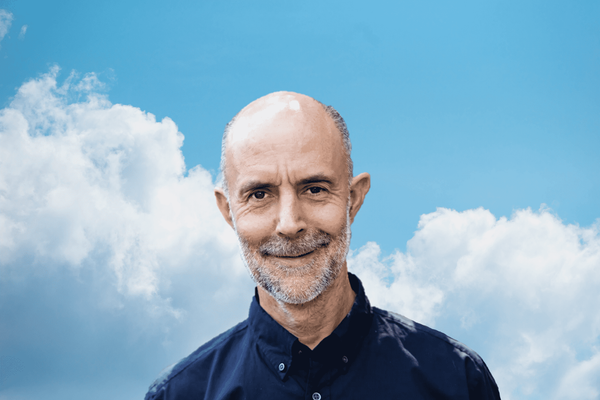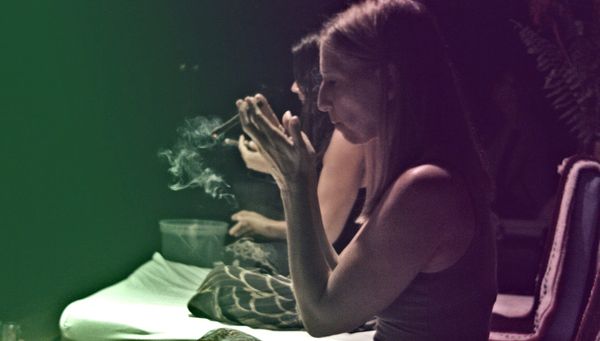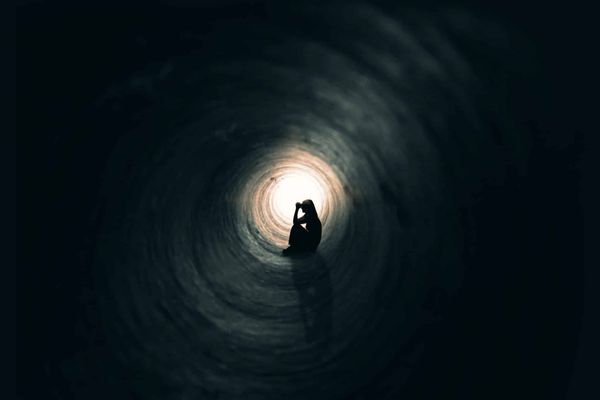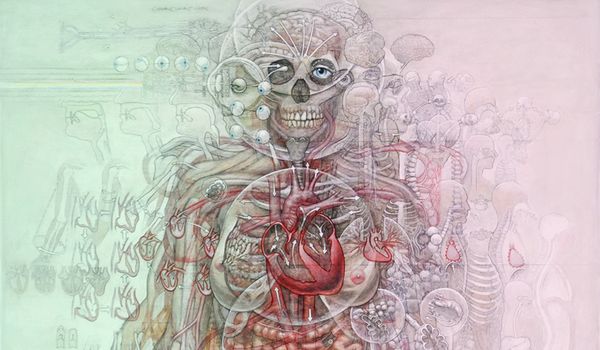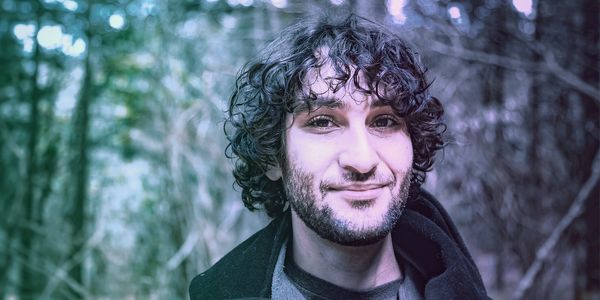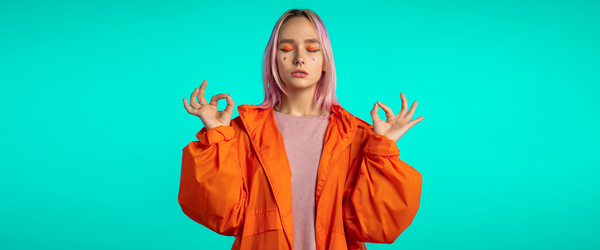Martijn Schirp • • 11 min read
60 Hours of Meditation in 5 Days: How The Whole World Became The Black Mirror of My Ego
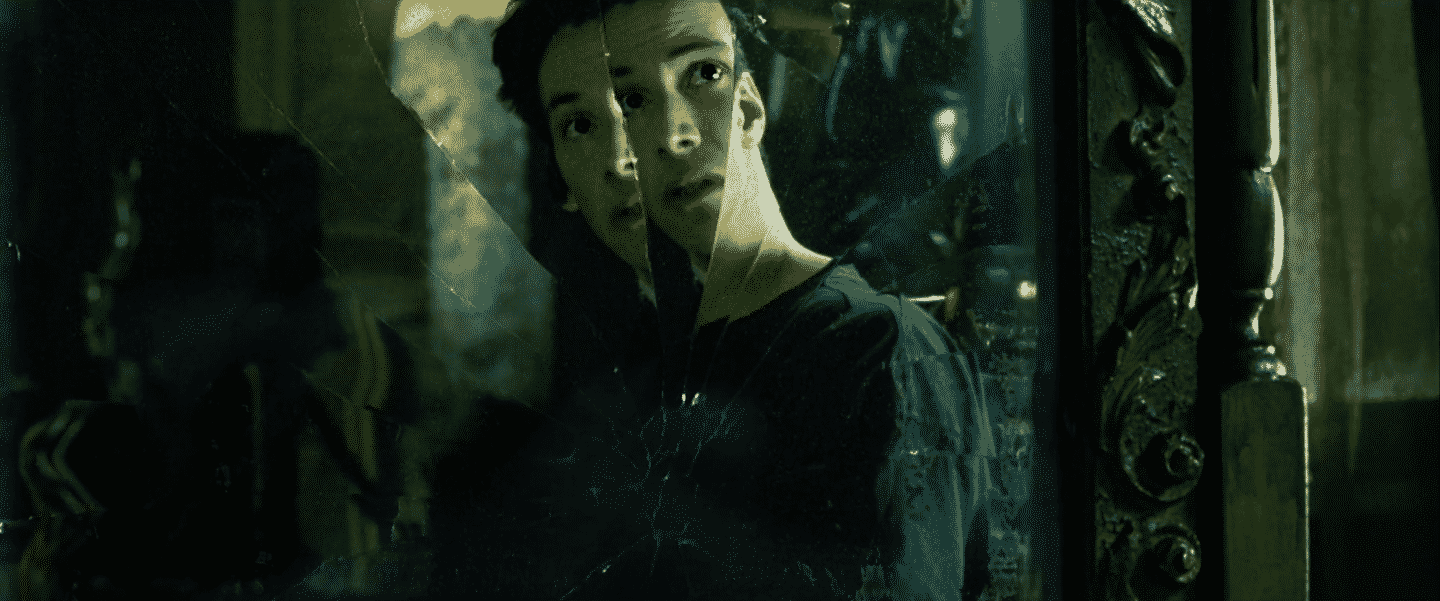
This body’s existence is like a bubble’s
may as well accept what happens
events and hopes seldom agree
but who can step back doesn’t worry
we blossom and fade like flowers
gather and part like clouds
worldly thoughts I forgot long ago
relaxing all day on a peak.
— Shiwu, Chinese Chan Hermit and Poet
I was once recommended a unique book on Buddhism called the Endless Path: Awakening Within the Buddhist Imagination: Jataka Tales, Zen Practice, and Daily Life. The collection of stories contained therein feature as their protagonist the various reincarnations of the Buddha, before he got enlightened. It deals with the difficulties on his path, the challenges he faced, and the way he approached these in his multiple lifetimes to attain full realization.
In one of the tales of the Jataka, the Buddha to be is a wise sage, living in a modest hut next to the King’s palace, giving awakened teachings. One day, perhaps by some form of transcendental karma, he sees the King’s Wife’s beautiful body uncovered by clothes. Her royal breasts and luscious hips awakening his flesh, he stumbles and sputters, excuses himself, and retreats back to his hut. Obsessed with sensual fantasies and overcome with intense desire to be with the Queen, he is unable to fulfill the role of sage any longer. His vows forgotten, dreams of a future with another man’s wife took complete possession of his mind. How did he manage to overcome this challenge?
Numerous stories like these, most easily relatable to our own daily lives and reflected in the small and larger choices we encounter, show how we can learn from our imperfections and continually mature on our own endless path. By the sheer convincing nature of the recommendation of this book, I decided to attain a copy. Yet, I never ended up reading it. It was enough to plant a seed, however, because when I got invited to an event in Costa Rica with world-class and awakened entrepreneurs from around the world only to find a Jataka Zen Sesshin (meditation retreat) where the author of this very book would hold daily talks on how the Buddha became the Buddha, and found that these two events perfectly lined up, I felt a deep knowing that I had to go. I felt “The Call”, as my good friend Nikolaj would enthusiastically proclaim.
While I knew it would do me a universe of good to heed the call, I wasn’t exactly thrilled to go. I would have to leave behind my cozy home and embark on a quest—a spiritual journey—to deal with the growing struggles I was facing. It was time to go out and look for new “powers.” I knew that. I recognized the feeling of being stuck in some areas, and how it was time to mature and find my way through the constant background feeling of despair and desolation. But I also knew I was facing the death of old emotional patterns and identifications. Stripping away parts of yourself never feels pleasant while you’re doing it. And naturally, for someone who was half-asleep, I was resisting it.Thankfully, mystical synchronicities woke me up from time to time which gave me a deep trust in my path. Looking for a meditation retreat and finding this opportunity felt like the perfect piece in my journey’s puzzle. And thus I found myself leaving my phone and computer, my voice, and all of my personal preferences behind to enter a Zen Sesshin in Costa Rica.
To be admitted, one had to show one was capable of enduring the strenuous regime. It would be disturbing to others if one would suddenly leave. Affinity with Zen practice was also required. While I’ve been on multiple month-long retreats before, none have been as strict as this one, and none were in the Zen tradition (Myanmar Vipassana & Tibetan Mahayana.) I never had to wear a robe before, walk a certain way, or attend formal one-on-one meetings with the Roshi (Dokusan). I was inspired to become the person who had gone through such ordeals and grown from them, inspired by the challenges the Buddha himself had to face on his unique way to enlightenment, but my past self who was facing this task was deeply intimidated. Somehow I knew this was going to be one of the hardest things I would ever do.
You must know I often feel intimidated in this way. Fear seems to be a constant companion on my numerous journeys. Where I differ from with most people, however, is that I rarely let this prevent me from taking right action. An emotional limit of the mind is just that, a self-composed barrier. It is our natural inclination to choose comfort and pleasantness, and feel averse to hardships and uneasiness. But to grow and evolve as a person, to truly become what we are, we must recognize these as the demons we must slay on our Hero’s Journey. To enter the richness of the kingdom which few may enter, we must prove, not in the least to ourselves, that we are up to the task. Enlightenment doesn’t just fall in your lap.
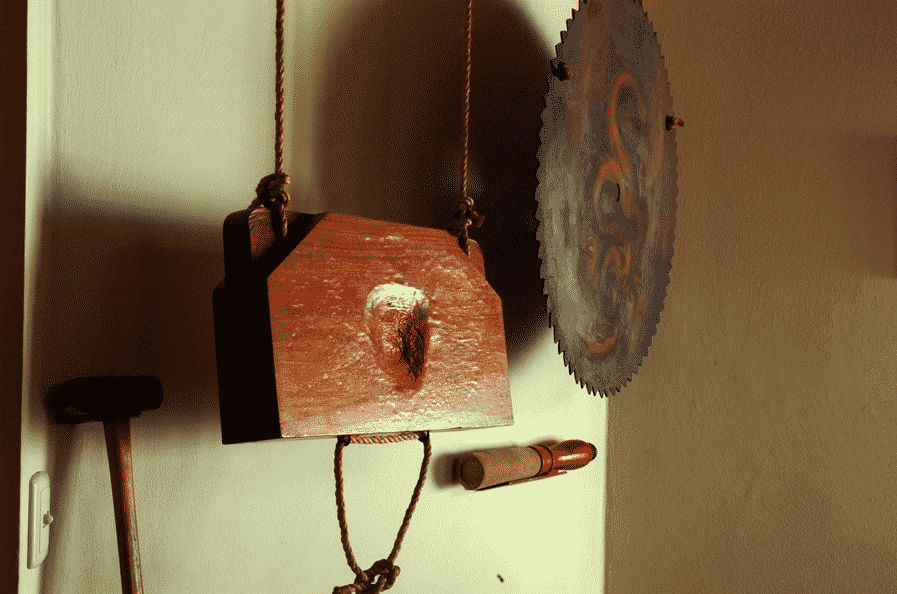
And thus jittery with a queasy nervousness I arrived in Casa Zen (literally, the House of Zen) a day early, to get acquainted with the rhythm of the place, to fit myself a robe, learn how to bow, chant, and follow the orderly process of a Sesshin. The How to Prepare for a Sesshin guide started with, “Going to sesshin is a bit like preparing oneself prior to taking a journey to a distant land. You need appropriate clothes, you need to know a few survival phrases, and you need to have passing familiarity with the culture. In the same way, when you come to sesshin, you need to dress correctly, you need to know a few terms, and you need to know what is expected of you.”
The moment-to-moment schedule is tightly regulated, and I knew the days would proceed as follows, with no talking, reading, eye contact, or writing.
4:30 . . . . . . . . . . . . . . . Wake-up bell
4:50 . . . . . . . . . . . . . . . Zazen and Dokusan
6:45 . . . . . . . . . . . . . . . Breakfast—formal meal
7:15 . . . . . . . . . . . . . . . Work period—Cleaning toilets, oiling wood
8:30 . . . . . . . . . . . . . . . Bell ending work period, start of rest period
9:45 . . . . . . . . . . . . . . . Zazen
10:00 . . . . . . . . . . . . . . Jataka Tale talk and discussion
12:30 . . . . . . . . . . . . . . Informal lunch, followed by open schedule
2:00 . . . . . . . . . . . . . . . Zazen and Dokusan
4:00 . . . . . . . . . . . . . . . Chanting followed by Tai Chi
5:15 . . . . . . . . . . . . . . . Informal dinner
7:00 . . . . . . . . . . . . . . . Zazen and Dokusan
The long-term residents invited me warmly into their home. They showed me around and smiled away the troubled fictions of my mind. A robe was given, a bed shown, and the ins and outs of Sesshin explained. These Sesshin veterans indicated that the opportunity to do such a retreat is a precious thing indeed, and that they looked forward to going through the challenges with me. Alone, such a task is often considered impossible.
The last thing I wanted was to be alone with myself. I was going through a phase of relationship distress (which will make for an amazing future article, when this particular story has played itself out), and my mind was going crazy with weird possibilities of being left alone—ironically the exact body-mind feeling I was now voluntarily subjecting myself to. I wanted to go home, fix what I perceived as threats to my current and future well being, and set things back in the proper order of my ego-constructed reality. Meditation could wait; there were more urgent matters to attend to now.
This was the story I believed in, which seemed totally real from where I was sitting, literally sitting, on my Zazen cushion, hours upon hours, wanting to get this retreat over with as soon as possible. But, as a good and neatly robed Buddhist, I went back to my breath, again and again. And while the breaks between these disturbing thoughts grew bigger as the impersonal time washed over me, the realness of my perceived situation didn’t diminish. There was a strong sense of a self under attack, and no matter what wisdom some Jataka tale could tell me about the illusionary nature of my current experience, I had to do something about it out there, and not sit still, in here.
Over time, however, the wisdom of the Buddha (to be), and the powerful setting of a strict Sesshin, eroded my strongly held resistance to my newfound relational position. The arrangement of time and activities during retreat is such that you literally have no choice in the matter of what you will do next. You follow the system. That is it. And while a structure of this kind relieves the planning self from its duty and frees up the mind completely, it is often met, initially, with opposition. Not being able to distract yourself to find a moment of alleviation will necessarily make you confront what is bothering you, instead of burdening your future self with it at a later date.
Oppose I did. Confronted I was. But no matter how much I tried, I didn’t find a way to symbolically set things right. I couldn’t find a way to reinterpret my position so that everything was in balance, and my ego contraction around the painful feelings could relax. No, it seemed so obvious that my outer conditions were completely wrong. But it slowly dawned on me that this obviousness was a sign that I was dissociating from a feeling and projecting it outward onto an external thing. In fact, I started seeing all my resistance as projections, in a clearer and more precise way than I had ever done before. This little Zen world became my whole world, and everything I did was reflected outside of me.
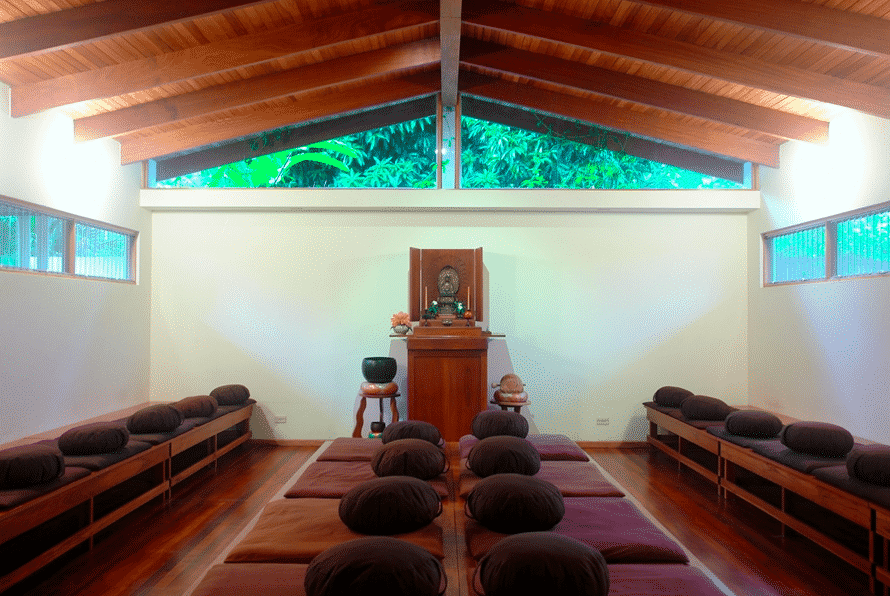
This tight, temporal program of sitting, walking, eating, cleaning, sitting, walking, learning, sitting, ad infinitum, ad nauseum, in this beautifully wood-carved house in the pleasant warmth of a Costa Rica dry-season proved to be the clearest mirror of my own psyche I ever had the pleasure of facing. Basically, if all you have to do is follow the schedule, go through the motions, and experience every moment of what is, without any personal preference, then it becomes very clear what your own generated bullshit is that you sprinkle on top. Everything that is not already there is something you have been bringing with you. And in this way, my mind revealed itself to be a master at lies and deceit, just to prevent myself from owning up to my own behavior that was causing all my misery.
I had a conversation with a wonderful writer during the entrepreneurship retreat I attended right after the Sesshin. We pleasantly talked about Zen, Sesshins, and whether to integrate psychedelics in Buddhist practice, and as we talked it became clear the person I was talking to had been practicing Zen for many years. He had wanted to do a retreat for a large portion of this time, but never mustered the energy to actually go. In the same breath, he asked if it was true there was no coffee allowed because that would be really difficult for him. I stared at him with disbelief and laughed at the lie. “You don’t want to do something you have been aspiring to do for years, just because there is no coffee? Really? That’s the shittiest excuse I ever heard!” With a big laugh, we painted a picture of monks doing austere Zen practice, but then really needing to go to Starbucks after. Needless to say, he promised himself to attend a retreat this year.
The way these foolish beliefs work became initially visible on my first day of cleaning the toilet and bathroom. I didn’t feel like doing this, at all, and I rationalized and substantiated these feelings with self-important thoughts like, “I am the CEO of a company which reaches millions, I don’t have to do these menial tasks.” and “This is beneath me. This is dirty. I am paying for this.” My perception of the world at hand was veiled thereby, and I was suffering because of it. I quickly realized, however, the illusionary and whimsical foundation of these beliefs. I had to use toilets too. Everyone here does. Others are making my food, and there are still others who keep the Zendo clean and tidy so I can meditate. We all need to pitch in. And so I realized there was no other way than to accept the feelings that co-dependently arose with scrubbing the porcelain thrones for relieving bowel contents.
And as soon as I did, the clouds lifted, and work became one of my favorite parts of the day, I finally felt a sense of purpose; I could finally do something. In the end I recognized this as another ego attachment to feeling self-worth as long as I was able to contribute. I would have probably felt aversion at the end of the retreat if I hadn’t been able to have added my share of the work and just let the others do it for me. But I digress. What is important here is that I wasn’t just aware of the cleaning movements of my body and the piercing smells of the detergents; I saw that I had initially imbued the whole situation with a meaning that was purely of my own making. I wanted to negate the initial unpleasant feelings associated with the task given to me, and I projected a reality unto it which would then discharge me from having to face them. Damn.
This way of seeing, this new power, slowly penetrated more deeply into the hidden foundations of what I believed to be real. I started seeing that more and more unpleasant realities actually had roots in my own being. Like a foolish God, I was wearing orange sunglasses and proclaimed the whole world orange.
But while it was painful to let in and accept the multicolored and nuanced world by letting go of my one-dimensional glasses, Sesshin showed that an orange-only version of existence was in no way preferable. In the normal world, the chaos confuses, and the ways of avoiding this pain are infinite, but during twelve-hour days of Zazen, that whole world becomes a clear-as-day mirror. I started to see the self-conceived proper order of my universe was but a fiction, and what was wrong was not the actions of people in it, but my perceptions of them. Cue: “There is nothing either good or bad, but thinking makes it so.”
On the third day, I experienced a breakthrough regarding my relationship issue. I allowed myself to see what skewed reality I was covering the situation with. My fear of being left alone created a distrustful and warped view scurrying for proof I was right, which exactly created the distance I saw as evidence that I would indeed be left alone. I was precisely creating that which I wanted to avoid. I only saw the reflections of my own mind, which left others around me no choice than to fit in to that reality. Talk about a self-fulfilling prophecy. But now that I saw it, I could take ownership of it.
Because I didn’t want to feel the fear of abandonment and the ensuing dread of loneliness, I was addicted to comforting thoughts and manipulating others to console me. When this desire wasn’t met, I blamed them, and avoided taking ownership of my own feelings. When it was met, it was a temporary relief, a momentary scratch of my emotional itch. But I am sure you know as well as I do that scratching doesn’t work, it only makes it worse. Yet, the dependency on the same need to scratch increases. This is why I was so suffering so much during the first days of Sesshin; the need to escape was a withdrawal symptom.
The moment I started taking responsibility for my feelings, which is not the same as judging them as either good or bad, but allowing them to arise in their full expression, the misperception started to dissolve. My ego contraction around the reality I created, a reality that left no room for any contra-indications, started to release, and I saw that it wasn’t all as bad as I thought it was. I wasn’t the victim, nor the assailant. There are just feelings and thoughts, not caused by anyone in particular, but just my current experience. My strategy for comfort didn’t work, and will never work. An addiction is a solution to a problem that only makes the problem worse. The only thing left to do, was to start acknowledging that some things are out of my control, and that I have to let those things go.
There was and is no way to know that things will end up all right. I can only keep taking right action, overcome the emotional limitations of my mind, see through the illusionary nature of all things, and find my own awakening as the Buddha himself did, on the endless path I traverse.
The wind brushed the whispering branches
A droplet of sweat on warm skin
The bird ended her song
What day is it?

